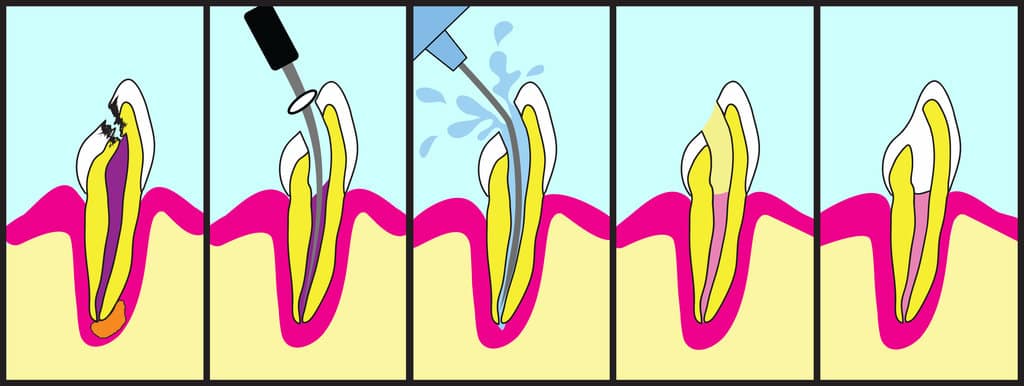National Root Canal Appreciation Day

 Today—the second Wednesday in May—is National Root Canal Appreciation Day! While it’s not exactly a mainstream holiday, it’s the perfect chance to give extra thought to your oral health. Consider how far root canals have come and how you can commemorate National Root Canal Appreciation Day.
Today—the second Wednesday in May—is National Root Canal Appreciation Day! While it’s not exactly a mainstream holiday, it’s the perfect chance to give extra thought to your oral health. Consider how far root canals have come and how you can commemorate National Root Canal Appreciation Day.
What is a Root Canal?
Your teeth are hard on the outside, but the core contains soft tissue filled with nerves and blood vessels. If this tissue, known as the pulp, becomes swollen in response to an infection or irritant, you could experience severe pain. Left untreated, a tooth in this condition is likely to fall out. Damage could also be done to the bone surrounding the tooth.
A root canal, also known as endodontic treatment, is a procedure that involves removing infected dental pulp, filling the tooth, and capping it with a crown. Root canals save teeth and preserve smiles. In fact, the American Association of Endodontists estimates that 15.1 million root canal treatments are performed each year by general dentists and endodontists, or root canal specialists.
When you visit the dentist for your root canal appointment, first your tooth is thoroughly cleaned out to remove the pulp. This is done using tiny, specially designed dental brushes. X-rays assist with this process to ensure all infected pulp is gone.
Next, your tooth is flushed with antibacterial fluid and filled to prevent a repeat infection. Finally, the tooth is sealed permanently with a dental crown to protect it from fracturing. This rigid, tooth-shaped covering is stronger than enamel, ensuring the structural integrity of your tooth is preserved. X-rays are taken at future appointments to ensure your tooth is still healthy and free of infection.
How Technology has Improved Root Canals
Root canals have a reputation for being frightening, painful procedures that you want to avoid at all costs. While you should always take steps to promote good oral health and prevent needing a root canal, getting one is not as unpleasant as you think.
Modern numbing agents mean you can’t feel a thing as your dentist cleans out your infected tooth. An apex locator also makes it possible to detect the precise depth of the canal. This ensures that no pockets of infection are left behind, and it also prevents the cleaning from going too deep. Finally, advancements in rubber technology allow the empty tooth to be filled thoroughly, thus helping to avoid re-infection of the treated tooth.
When is a Root Canal Needed?
Do you have a dull toothache or constant, throbbing pain? Have you struggled with sensitivity to hot and cold drinks for a long time now? Do you experience stinging pain when you chew in a particular spot? Have you noticed a bad taste in your mouth lately?
These are all signs that you might have a tooth infection and need a root canal. Even if you don’t, it doesn’t hurt to see your dentist. After all, an untreated infection could cause an abscess, damage to your jaw bone, and tooth loss. It’s much easier—and more affordable—to treat your toothache early.
How to Prevent Needing a Root Canal
The best preventative measure is to exercise good oral hygiene. This includes brushing your teeth twice a day with fluoride toothpaste, flossing once a day, and avoiding sugary foods and drinks.
If you grind your teeth when you sleep, wearing a night guard can help prevent putting undue stress on your teeth that could cause an infection. You can also avoid damaging your teeth by wearing a mouthguard when you play contact sports.
Most importantly of all, schedule routine visits to the dentist. A thorough oral exam and X-ray can reveal problems in their early stages. This allows you to increase your preventative efforts and address dental issues before they cause severe pain or permanent damage.
Commemorating National Root Canal Appreciation Day
The best ways to celebrate National Root Canal Appreciation Day are to purchase a new toothbrush, resupply your stock of dental floss, and schedule your next dentist appointment. If you’re concerned about the health of your teeth and gums, you can always call your dentist for personalized tips to prevent infections that lead to a root canal.
Call Dr. Ania for an Oral Health Consultation
Now that you appreciate root canals a little more, you may be prepared to address your lingering toothache. The quicker you act, the easier it is to treat the problem before it escalates into something larger.
Dr. Ania uses state-of-the-art technology and tools to perform quick, effective root canals that treat your pain and put your mind at ease. Call Dr. Ania’s Boulder, CO dentist office today at 303-443-0998 to schedule an oral health consultation and find out if you need a root canal.


